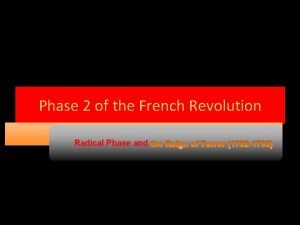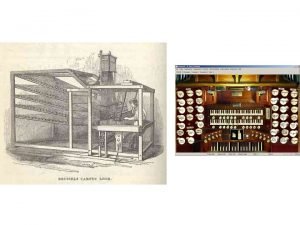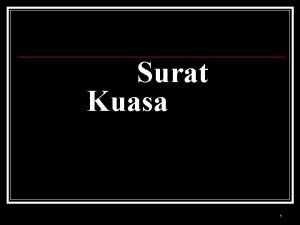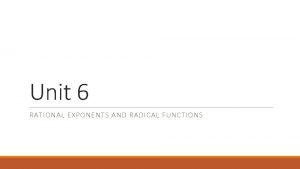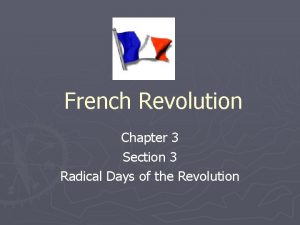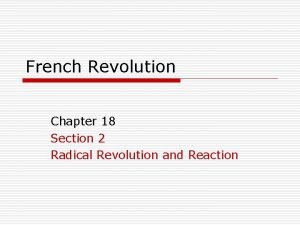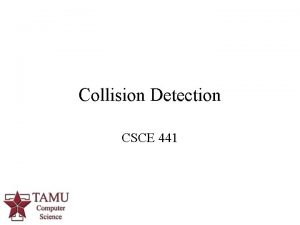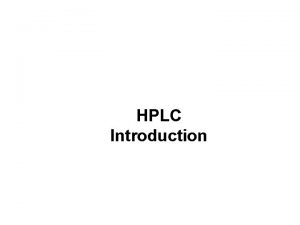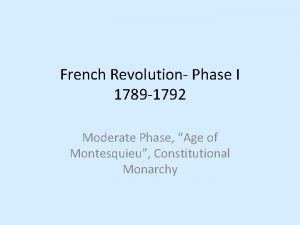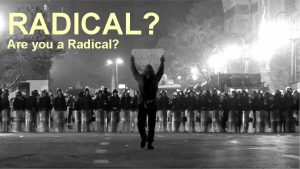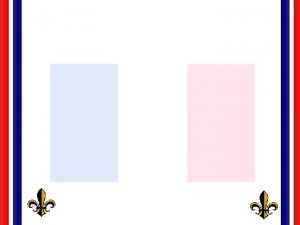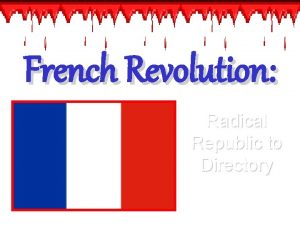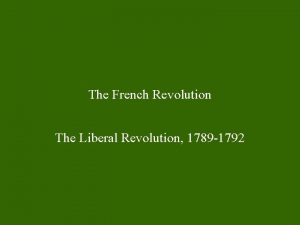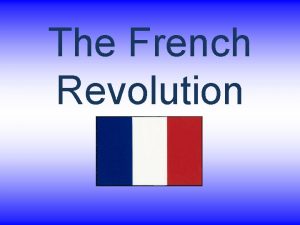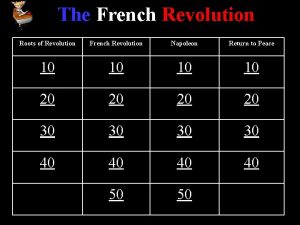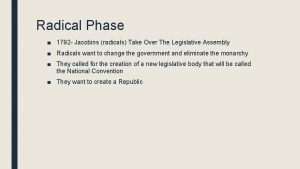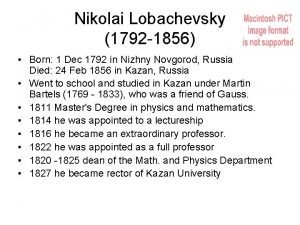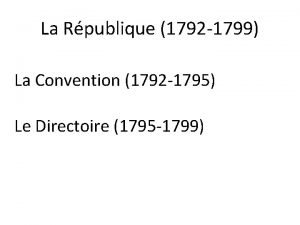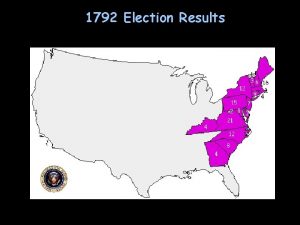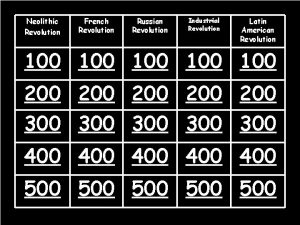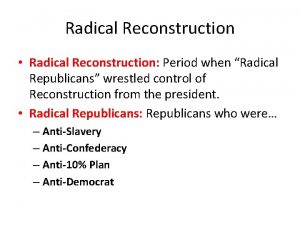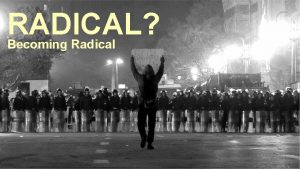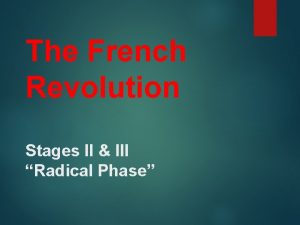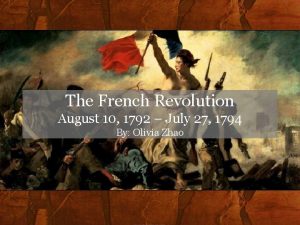French Revolution n Radical Phase 1792 94 Spreading

























- Slides: 25

French Revolution n Radical Phase (1792 -94)

Spreading the Gospel of Revolution n The French Revolution took on the character of a religious crusade. n It was not enough to have a revolution at home. The gospel of revolution must be spread to the rest of Europe. n France declared war on Prussia and Austria and proclaimed that it advanced the cause of liberty.

The French Flag n The Marquis de Lafayette, commander of the new National Guard, combined the colors of the King (white) and the colors of Paris (blue and red) for his guardsmen's uniforms and from this came the Tricolor, the new French flag.

The Marseillaise Arise you children of our motherland, Oh now is here our glorious day ! Over us the bloodstained banner Of tyranny holds sway ! Oh, do you hear there in our fields The roar of those fierce fighting men ? Who came right here into our midst To slaughter sons, wives and kin. CHORUS To arms, oh citizens ! Form up in serried ranks ! March on, march on ! And drench our fields With their tainted blood!

The September Massacres n n The country was embroiled in a foreign war. The new government had declared war against the powerful Austria and in the beginning it did not go well for France. Complicating matters was the fact that counterrevolutionary Frenchmen were working with Austria in the hopes of turning back the revolution. In France people saw counter-revolutionaries under every rock.

Georges-Jacques Danton n Georges-Jacques Danton, a revolutionary leader and a powerful orator, rose in the Assembly on September 2 nd 1792 and boomed out these memorable words in his deep bass voice: "When the tocsin sounds, it will not be a signal of alarm, but the signal to charge against the enemies of our country. . . To defeat them, gentlemen, we need boldness, and again boldness, and always boldness; and France will then be saved. "

Georges-Jacques Danton: "Boldness and again boldness, and always boldness"

Let the blood of the traitors flow n Danton probably meant boldness in fighting the war against Austria. But many took his words to refer to enemies within France. n The radical press took up the cry, "Let the blood of the traitors flow, " and within hours of Danton's speech the streets of France did indeed run with blood. n By September 7, over 1000 were dead.

The Execution of Louis XVI The constitutional monarchy put in place by moderate revolutionaries gave way to a radical republic. n The National Convention decided to put Louis on trial for his crimes. n – Although his guilt was never an issue, there was a real debate in the Convention on whether the king should be killed. – They voted for his execution. n On January 23, 1793 Louis Capet went to the guillotine in the Place de la Concorde, where a statue of his predecessor, Louis XV, once stood. – At the scaffold he said "I forgive those who are guilty of my death. "

The execution of Louis XVI

Two Radical Groups n During the constitutional monarchy there were two radical groups vying for power, the Girondins and the Jacobins. n Although both groups were more radical in their views than the moderates who had designed the constitutional monarchy, the Girondins were somewhat less radical. n In late 1791, the Girondins first emerged as an important power in France.

United in their Views n At first the two parties were united in their views. – The Girondins were concerned about the plight of the blacks in France's colonies and were instrumental in passing legislation granting equal rights to all free blacks and mulattoes. – They wanted the declaration of war against Austria in early 1792 in the hopes that a show of strength would give them leverage with the King.

Jean-Paul Marat When Jean-Paul Marat, a Jacobin journalist who showed little regard for the truth, was arrested for attacking Girondins, the people of Paris turned even more toward the Jacobins. n The people loved Marat and he seemed to love them too. n When he was acquitted of the charge, the crowds swarmed around him, scooped him up on their shoulders and carried him to the Convention, cheering all the way. n

The Rise of the Jacobins n n When the constitutional monarchy fell and he King was put on trial for treason in December, the Girondins argued against his execution. The Jacobins thought he needed to die to ensure the safety of the revolution. When the Jacobins were successful the tide turned against the Girondins. The Jacobins in the National Convention had 22 Girondin leaders arrested and executed. The Jacobins had won.

The Death of Marat n A final Girondin blow was struck, however, when Charlotte Corday, a Girondin sympathizer, gained entrance to Marat's bath and stabbed him. n Marat immediately became a martyr to the revolution. He was given a hero's funeral and the procession lasted 7 hours.

The Death of Marat by Jacques-Louis David

The Reign of Terror n After the death of Louis in 1793, the Reign of Terror began. – Marie Antoinette led a parade of prominent and notso-prominent citizens to their deaths. – The guillotine, the new instrument of egalitarian justice, was put to work. Public executions were considered educational. Women were encouraged to sit and knit during trials and executions. n The Revolutionary Tribunal ordered the execution of 2, 400 people in Paris by July 1794. Across France 30, 000 people lost their lives. n

Watch Committees The Terror was designed to fight the enemies of the revolution, to prevent counter-revolution from gaining ground. n Most of the people rounded up were not aristocrats, but ordinary people. n – A man (and his family) might go to the guillotine for saying something critical of the revolutionary government. – Watch Committees around the nation were encouraged to arrest "suspected persons, . . . those who, either by their conduct or their relationships, by their remarks or by their writing, are shown to be partisans of tyranny and federalism and enemies of liberty" (Law of Suspects, 1793).

Suspension of Civil Liberties n Civil liberties were suspended. – The Convention ordered that "if material or moral proof exists, independently of the evidence of witnesses, the latter will not be heard, unless this formality should appear necessary, either to discover accomplices or for other important reasons concerning the public interest. " – The promises of the Declaration of the Rights of Man were forgotten. – Terror was the order of the day. In the words of Maximilien Robespierre, "Softness to traitors will destroy us all. "

Maximilien Robespierre n "Terror is nothing other than justice, prompt, severe, inflexible"

Republic of Virtue n Robespierre was the mastermind of the Reign of Terror. – He was the leader of the Committee of Public Safety, the executive committee of the National Convention, and the most powerful man in France. – He explained how terror would lead to the Republic of Virtue in a speech to the National Convention: “If the spring of popular government in time of peace is virtue, the springs of popular government in revolution are at once virtue and terror: virtue, without which terror is fatal; terror, without which virtue is powerless. Terror is nothing other than justice, prompt, severe, inflexible. . . ” Speech on Terror n The old maxim "the end justifies the means" describes Robespierre's policy well.

The Last Victim of the Reign of Terror n Even the radical Jacobins, the supporters of Robespierre, come to feel that the Terror must be stopped. – Danton rose in the Convention calling for an end to the Terror. He was its next victim. – When Robespierre called for a new purge in 1794, he seemed to threaten the other members of the Committee of Public Safety. n The Jacobins had enough. – Cambon rose in the Convention and said “It is time to tell the whole truth. One man alone is paralyzing the will of the Convention. And that man is Robespierre. ” – Others quickly rallied to his support. – Robespierre was arrested and sent to the guillotine the next day, the last victim of the Reign of Terror.

The Directory n People had grown tired of the instability and bloodshed of the revolution and were ready for something more moderate. n By 1795, the republic was gone, and 5 men with business interests had the executive power in France. n This new government was called The Directory. – It was far more conservative than the Jacobin republic had been. – It was also ineffectual.

Napoleon Bonaparte The people readily accepted the coup d'etat of Napoleon Bonaparte in 1799. n The revolution was over. Or was it? n

Sources n Adapted from Liberté, Egalité, Fraternité: The French Revolution by Jennifer Brainard. See http: //www. historywiz. com/frenchrev-mm. htm
 Radical revolution 1792-94
Radical revolution 1792-94 You should hope that this game will be over soon
You should hope that this game will be over soon Russian revolution vs french revolution
Russian revolution vs french revolution Phase 2 of the french revolution
Phase 2 of the french revolution Charles babbage (1792-1871)
Charles babbage (1792-1871) Mount unzen eruption 1792 facts
Mount unzen eruption 1792 facts Pasal 123 hir
Pasal 123 hir Entire radical examples
Entire radical examples Entire to mixed radical
Entire to mixed radical Unit 6 test radical functions
Unit 6 test radical functions Chapter 18 section 3 radical days of the revolution
Chapter 18 section 3 radical days of the revolution Radical revolution and reaction 18-2
Radical revolution and reaction 18-2 Green revolution vs third agricultural revolution
Green revolution vs third agricultural revolution Normal phase vs reverse phase chromatography
Normal phase vs reverse phase chromatography Broad phase vs narrow phase
Broad phase vs narrow phase Normal phase vs reverse phase chromatography
Normal phase vs reverse phase chromatography Difference between phase voltage and line voltage
Difference between phase voltage and line voltage Mobile phase and stationary phase
Mobile phase and stationary phase Hplc reverse phase vs normal phase
Hplc reverse phase vs normal phase Hplc detector types
Hplc detector types Chromatography mobile phase and stationary phase
Chromatography mobile phase and stationary phase In a triangle connected source feeding a y connected load
In a triangle connected source feeding a y connected load 5th may 1789
5th may 1789 French revolution
French revolution French revolution graphic organizer
French revolution graphic organizer Neoclassisim
Neoclassisim



